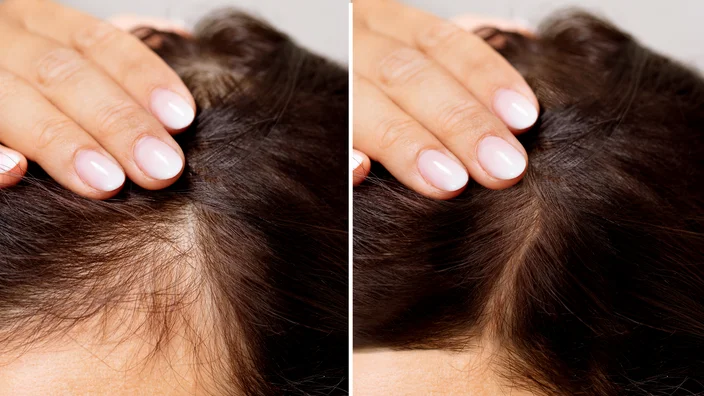Here’s what current, expert-backed sources reveal about the best scalp treatment for thinning hair—including evidence-based medications, highly rated topical options, and natural remedies that support scalp health:
Table of Contents
FDA-Approved Treatments
Best Scalp Treatment for Thinning Hair #1: Minoxidil (e.g., Rogaine)
An over-the-counter topical solution or foam proven to slow hair loss and stimulate regrowth.
Improvement usually begins after 12 to 16 weeks of consistent use, with continued application required to maintain results.
Possible side effects include scalp irritation or unintended hair growth on nearby skin.
- Finasteride – A prescription oral medication that reduces the hormone DHT, which contributes to follicle shrinkage and thinning, particularly in male pattern baldness.
- Ketoconazole – Often found in anti-dandruff shampoos; it may support scalp health and reduce shedding when used regularly as part of a comprehensive treatment plan.
These three—minoxidil, finasteride, and ketoconazole—are widely recognized as the “big three” for treating thinning hair.
Expert-Recommended Topical & Scalp Products
- Nutrire T.2 Night Serum – Offers exfoliating and hydrating benefits using jojoba and pumpkin seed oils; recommended for scalp health and fullness.
- Nioxin System 2 Shampoo – Designed for untreated thinning hair, contains niacinamide and caffeine to invigorate the scalp.
- Rogaine Women’s 5% Minoxidil (Serum) – A proven, FDA-approved topical treatment that reactivates dormant follicles and slows loss.
- Olaplex No. 8 Bond Intense Mask – Strengthens and moisturizes fragile hair strands without weighing them down.
- Pura D’Or Organic Moroccan Argan Oil – Promotes scalp health with vitamin E and essential fatty acids.
- Viviscal Supplements – Contain the clinically tested AminoMar complex to support hair growth when taken as directed.
- Isdin Lambdapil Hair-Density Leave-In Lotion – A lightweight serum enriched with biotin and zinc. Dermatologists note that it boosts scalp microcirculation and strengthens hair density.
From Glamour, notable serums include:
- The Ordinary Multi-Peptide Serum – A budget-friendly option with peptides suited for overall scalp and hair density.
- Act + Acre Stem Cell Scalp Serum – A higher-end option ($78) praised for luxurious, concentrated formulas.
Natural & Holistic Treatments
- Green coffee rinse or hair mask – Packed with antioxidants, improves blood flow to the scalp, reduces hair fall, and strengthens roots when used weekly or bi-weekly.
- Til (sesame) oil – Rich in vitamins and minerals, it hydrates the scalp, reduces split ends, fights dandruff, and enhances shine; ideal for regular warm-oil massages.
- DIY oil blends – A Reddit-shared routine included rosemary-peppermint spray and a mix of castor, jojoba, onion, and coconut oils, alongside a whole-food diet. Claims noted visible improvements over months.
- Creip Hair Growth Spray – A plant-based topical containing rosemary oil (some studies find results similar to minoxidil), biotin, caffeine, and more. Vocal users report better texture and growth with consistent use, though results remain anecdotal.
- Supplements like biotin, saw palmetto, ginseng, collagen peptides, and rosemary extract – These may support hair health by targeting nutrients, DHT, circulation, and structural protein production.
Lifestyle & Scalp Care Habits
- Scalp massage – Gentle daily massage improves blood flow, helps reduce sebum buildup, and creates a healthy environment for follicles. Avoid harsh pressure to prevent irritation.
- Balanced nutrition – A diet rich in protein, iron, zinc, biotin, vitamins D/E/C/A, healthy fats, and antioxidants supports hair’s structural needs and scalp environment.
- Sun exposure – Around 15 minutes daily (without sunscreen) helps your body generate vitamin D3, which plays a role in hair follicle health.
- Gentle hair care – Avoid over-styling, harsh treatments, or skipping washes. Shampooing every 48 hours with products that support the scalp’s microbiome (e.g., antimicrobial oils) can maintain balance and reduce shedding.

Summary Table
| Category | Recommended Treatments |
|---|---|
| FDA-Approved Meds | Minoxidil, Finasteride, Ketoconazole |
Photo credits: AndreyPopov/iStock via Getty Images